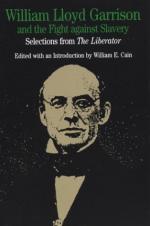|
This section contains 2,391 words (approx. 8 pages at 300 words per page) |

|
SOURCE: Nye, Russel B. William Lloyd Garrison and the Humanitarian Reformers, pp. 198-206. Boston: Little, Brown and Company, 1955.
In the following excerpt, Nye concentrates on Garrison's religious motivation to combat human evil by eradicating slavery. The critic also stresses exaggerations in the Garrison legend, while acknowledging Garrison's considerable historical and symbolic significance to American abolitionism.
Garrison's mind worked on two levels, the moral and the practical. On the one, his approach to issues was determined by principle; on the other, by tactics and strategy. The level of his argument fluctuated, as it did during the Civil War when he scourged Lincoln on principles, yet pleaded the value of expediency. Fundamentally, his approach to things was simple and consistent. He judged everything by two standards of moral right—natural law as expressed in the Declaration of Independence, and Christian ethic as expressed in the Bible. To him these were...
|
This section contains 2,391 words (approx. 8 pages at 300 words per page) |

|


